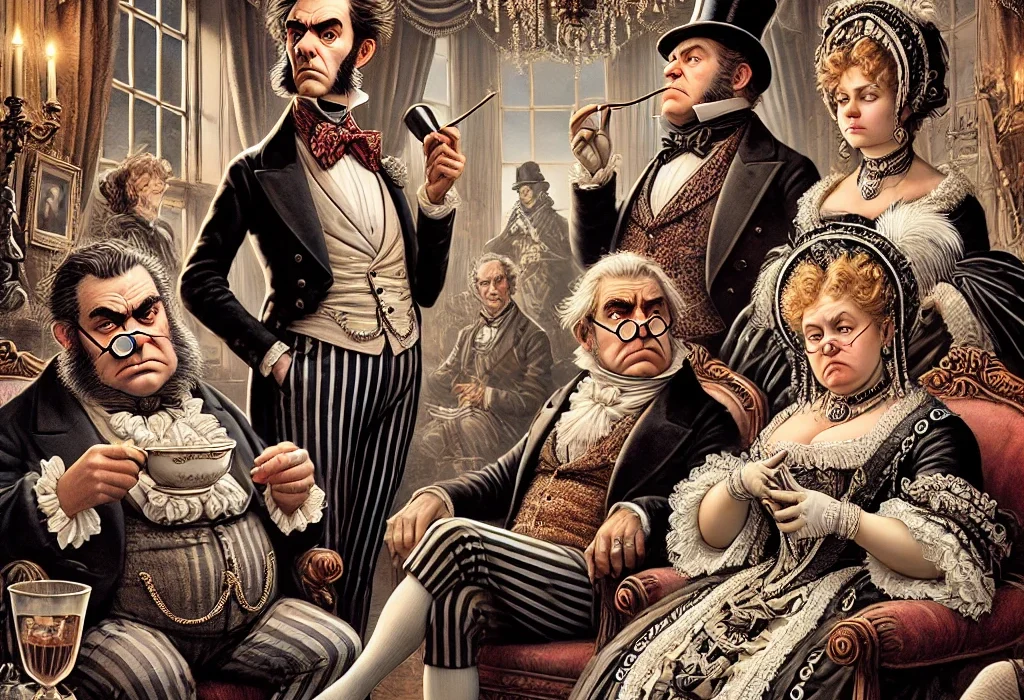The Book of Snobs by William Makepeace Thackeray was first published in 1848. This satirical work, originally serialized in Punch magazine, offers an incisive and humorous examination of British society, focusing on the behaviors, hypocrisies, and pretensions of people across all social classes. Thackeray’s wry observations introduce the concept of “snobbery” in a modern sense, detailing individuals who are overly concerned with social status and wealth.
Plot Summary
In the bustling heart of British society, a man wanders with a sharp eye, observing the peculiarities of those around him. He is a man of wit and keen insight, destined to unravel one of the great truths of human nature: the omnipresence of snobs. These curious creatures are not confined to the upper echelons of society, nor are they found exclusively among the lower ranks. No, snobs exist everywhere, lurking behind titles and fortunes, hiding in the homes of the humble and the mighty alike. And it is his mission, perhaps even his burden, to expose them.
Our chronicler begins his journey in an era where social hierarchies dominate every aspect of life. From the grandest palaces to the quaintest inns, society dances to the tune of status and wealth. It is here that snobbery thrives. At a fashionable inn, the narrator encounters one such character, Colonel Snobley, a military man who struts about with polished boots, a groomed mustache, and an air of entitlement. The Colonel is a man obsessed with appearances, forever smoothing his whiskers and pretending to be something grander than he is. He is, as the narrator observes, a positive snob—someone whose entire existence is defined by his need to prove his superiority.
But Colonel Snobley is far from alone. As the narrator delves deeper into society, he encounters snobs of every kind. There is George Marrowfat, a man whose friendship is severed when the narrator witnesses an unspeakable act: Marrowfat eats peas with a knife. Though George is a man of fine qualities, this single breach of etiquette is enough to drive a wedge between them. The narrator, torn between his love for his friend and the horror of such behavior, eventually reunites with Marrowfat when he reforms his ways and begins using his fork as society dictates. It is a small victory in the ongoing battle against snobbery.
As he ventures further, the narrator finds himself in the presence of the ultimate snobbery: royalty. One summer evening, in the royal village of Kensington, he observes the lavish comings and goings of noblemen and their servants. The royal footmen, draped in crimson and gold, march into the gardens with a confidence that sends the lesser flunkeys scurrying into the shadows. It is a stark reminder that, in this world, even servants have their own hierarchy. The narrator muses on the absurdity of it all—how those who serve are themselves enslaved by notions of rank and privilege.
Yet it is not only in the grandeur of royal courts or the folly of military men that snobbery thrives. The narrator encounters Lady Susan Scraper, a woman of impeccable respectability. Her life is a testament to outward propriety—she donates to charities, attends church regularly, and carries herself with the gravitas of someone who believes herself the finest of women. Her crest and coat-of-arms are emblazoned on every piece of silver in her home, her footmen wear immaculate livery, and her carriage rattles through the streets of London with all the pomp and circumstance of a royal procession. Yet, beneath this veneer of respectability, there is a hunger—one that gnaws at her family’s financial stability, driving them to live beyond their means. Lady Scraper’s devotion to appearances traps her in a world of empty grandeur, and though she would never imagine it, she too is a snob.
In contrast, there is Sir Alured Mogyns, a man who has carefully crafted his rise in society. Born Muggins, he has transformed himself into Sir Alured Mogyns Smyth de Mogyns, a figure of fabricated nobility. His family tree, a recent invention, stretches back to the mists of antiquity—or so the story goes. With his newfound title and his wife, the formidable Lady Marian, Sir Alured ascends the social ladder, hosting grand parties in their palatial home. Guests arrive in splendid carriages, greeted by liveried servants in garish uniforms. Yet, despite his pretensions, Sir Alured’s origins remain visible to those who know where to look. His name may have changed, but beneath it all, he is still the ambitious Muggins, desperate to be more than he is.
The narrator’s observations extend to every corner of society, where snobbery pervades even the most mundane aspects of life. A chance encounter at a Sunday service reveals the depth of this affliction. Two gentlemen discuss the clergyman, and one’s respect for him grows exponentially upon learning that he serves as the chaplain to a lord. The narrator marvels at how easily people are swayed by titles and positions, their esteem rising or falling based on nothing more than an association with nobility. It is a pattern he sees repeated over and over again—whether in the admiration of a royal, the blind loyalty to an aristocrat, or the sycophantic behavior of those who hope to gain favor.
Through his journey, the narrator reveals that snobbery is not merely a personal flaw but a societal ill. It infects every layer of the social fabric, driving men and women to absurd lengths in their quest for status and recognition. From the royal courts to the dining tables of commoners, the desire to be seen as superior—whether by wealth, title, or lineage—warps relationships, blinds individuals to their own hypocrisies, and creates a world where appearances are valued above all else.
In the end, the narrator concludes that snobbery, much like death, touches all men equally. It pervades the lives of the high-born and the low, the wealthy and the poor. And while he may never rid the world of snobs, his task is not in vain. For in shining a light on their pretensions, he hopes to inspire a few, at least, to see the folly of their ways and to embrace a more genuine existence, free from the shackles of status and appearance.
Main Characters
- Narrator (Thackeray as “Mr. Snob”): The narrator presents himself as the foremost expert on snobs, humorously analyzing and exposing them in every facet of society. His dry wit and sharp observations form the backbone of the book, as he chronicles encounters with various types of snobs.
- Colonel Snobley: A recurring figure representing the military snob, obsessed with superficialities like fashion and his mustache. He exemplifies those who adopt airs and pretensions due to their position rather than any real merit.
- George Marrowfat: Introduced as an acquaintance of the narrator, Marrowfat symbolizes the relative snob, whose snobbish behaviors manifest in specific social settings. His arc humorously resolves with his reform after the narrator’s moral scrutiny.
- Lady Susan Scraper: A paragon of respectability and social standing, Lady Scraper represents the aristocratic snob, someone who is deeply invested in her lineage, her charity work, and the external trappings of wealth and virtue.
- Sir Alured Mogyns: A social climber who has fabricated a noble lineage, Sir Alured represents the newly wealthy snob. His obsession with establishing an aristocratic identity reflects Thackeray’s satire on the upper class’s fixation with titles and lineage.
Theme
- Snobbery and Social Class: The central theme of the book revolves around the snobbery prevalent in all levels of society, not just the upper classes. Thackeray exposes how people of various backgrounds—whether aristocrats or tradesmen—behave snobbishly, with an excessive concern for social status.
- Hypocrisy and Pretense: Thackeray highlights the hypocrisy of individuals who outwardly display respectability or virtue but are driven by self-interest and vanity. Characters often maintain appearances while masking selfish motives, making this a key element in the satire.
- Social Critique: Through humor, Thackeray critiques the rigid class structure of Victorian England. He shows how those in power are often undeserving of their status, while others aspire to aristocratic lifestyles at the cost of authenticity or moral integrity.
- Manners and Etiquette: Many of the characters’ behaviors are tied to societal expectations of propriety, such as how to dress or act in certain circles. Thackeray mocks these superficial conventions, particularly when they lead to absurd or demeaning actions (like eating peas with a knife).
Writing Style and Tone
Thackeray’s style in The Book of Snobs is a mix of humor and biting satire, offering both witty remarks and sharp critiques of society. His language is conversational, often addressing the reader directly, which creates a sense of intimacy and shared amusement at the follies he describes. He uses hyperbole and exaggeration to great comedic effect, emphasizing the absurdity of snobbish behaviors. Thackeray’s irony is particularly notable, as he often adopts the voice of a snob himself in order to mock the pretensions of his subjects.
The tone of the work is playful yet cutting, with moments of moral clarity that underpin the humor. While Thackeray clearly enjoys poking fun at the ridiculousness of his characters, there’s also an underlying sense that he’s urging his readers to reflect on their own behaviors and values. This balance of comedy with moral critique makes The Book of Snobs both entertaining and thought-provoking.
We hope this summary has sparked your interest and would appreciate you following Celsius 233 on social media:
There’s a treasure trove of other fascinating book summaries waiting for you. Check out our collection of stories that inspire, thrill, and provoke thought, just like this one by checking out the Book Shelf or the Library
Remember, while our summaries capture the essence, they can never replace the full experience of reading the book. If this summary intrigued you, consider diving into the complete story – buy the book and immerse yourself in the author’s original work.
If you want to request a book summary, click here.
When Saurabh is not working/watching football/reading books/traveling, you can reach him via Twitter/X, LinkedIn, or Threads
Restart reading!








